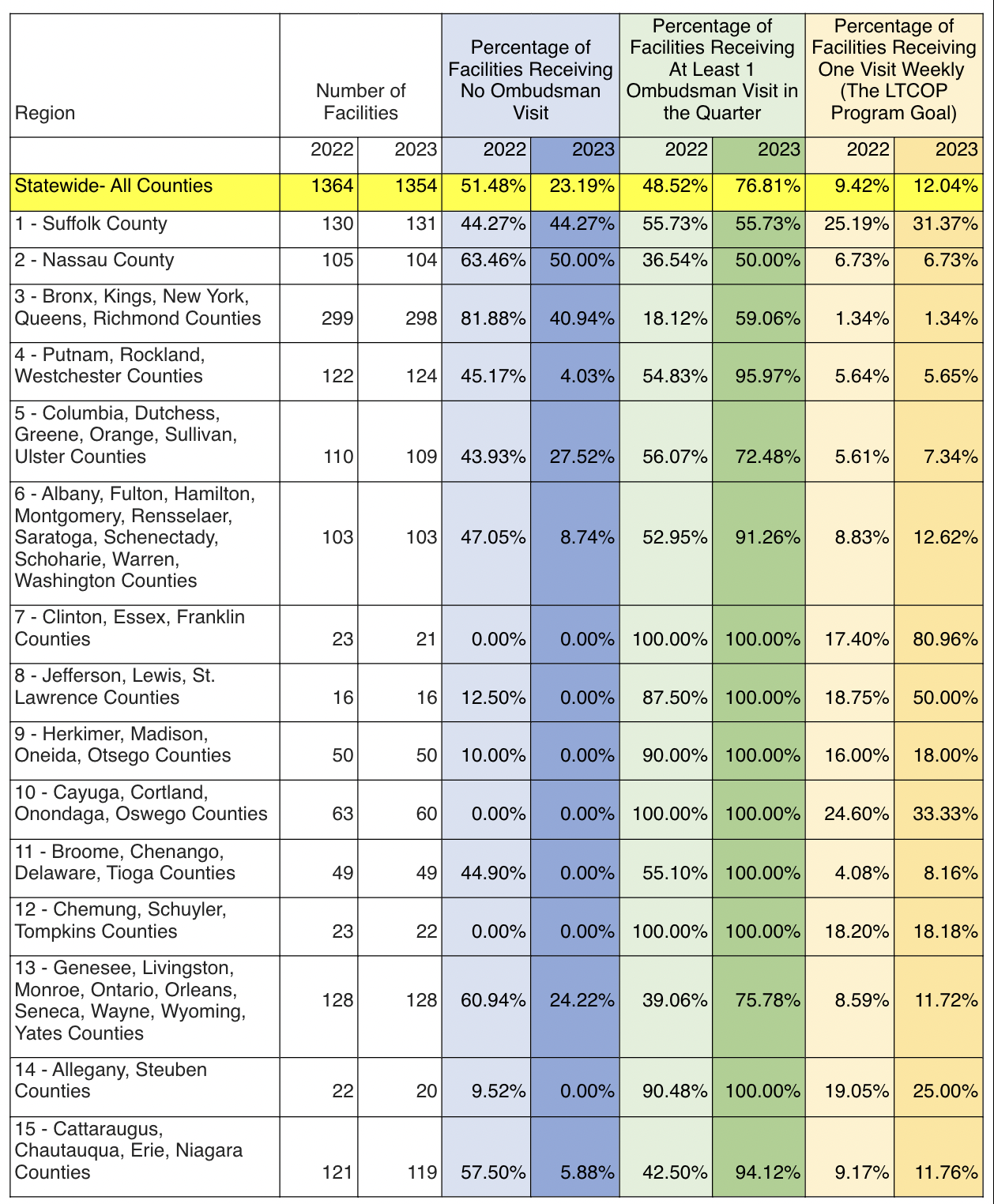
Governor Hochul’s State Budget Fails to Address Nursing Homes Oversight: AARP NY Report
Designed to Protect Vulnerable Residents, the Long Term Care Ombudsman Program Lacks the Funding to Do Its Job Right
ALBANY, N.Y. – A New York State nursing homes oversight program designed to protect some of our most frail and vulnerable residents continues to fail in its stated goal of visiting every facility at least once a week, a stark indication that thousands of aging New Yorkers still are lacking a vital layer of protection, according to a report by AARP New York.
Governor Hochul’s 2024-25 state budget plan cuts support for the Long Term Care Ombudsman Program (LTCOP) that has been woefully underfunded for years and neglected by the Hochul Administration.
The federally required LTCOP, administered by the State Office for the Aging (SOFA), is supposed to be the voice of the frail elderly in nearly 1,400 adult care institutions. It helps residents and their family caregivers understand and exercise residents’ rights and intervenes to help protect residents by resolving specific quality-of-care issues. LTCOP’s stated goal is to have a regular presence in all long-term care facilities, which is considered at least one visit per week per facility.
The latest review (see below) by AARP New York of SOFA’s own records from the fourth quarter of 2022 and the latest data from 2023 finds that only 12% of facilities received a weekly visit in person by an ombudsman. While that figure is up from 9% it still means 88% of all institutions statewide did not get visited by an ombudsman at least once a week.
“It’s a sad and startling fact: New York State continues to underfund a program that serves as the on-the-scene advocate for some of our frailest New Yorkers, said AARP New York State Director Beth Finkel. “While there are improvements in some regions of the state in the number of facilities that received weekly visits, the overall picture is nothing to crow about. LTCOP needs adequate funding – not cuts – to carry out its job the way it was intended, thus ensuring each facility gets visited by an ombudsman at least once a week. This personal and hands-on layer of oversight is vital to family caregivers who cannot be at their loved one’s side as well as for ensuring the well-being and safety of residents living in nursing homes and other adult care facilities.”
Most LTCOP ombudsman are volunteers who do extraordinary work addressing the needs of adult care residents. But the program overly relies on volunteers because it lacks enough professional staff, limiting its ability to meet the demand for services and care by long-term care facilities’ residents. LTCOP has had its funding increased by $5 million in the last two state budgets, with 24 full-time employees added to its staff. Yet, that is not enough, as evidenced by AARP New York’s latest LTCOP report.
The report also contains nearly 1,100 complaints concerning quality adult care reported in a single quarter. The complaints regarding poor-quality care include accidents and falls, response to requests for assistance, medications, personal hygiene, access to health-related services, incontinence care and infection control.
In addition, 37 complaints in the same reporting period concerned gross neglect and exploitation that includes physical and sexual abuse.
Among the report’s findings:
– In some of the state’s most populous counties – including Nassau, Putnam, Rockland and Westchester – there was no increase in the number of weekly visits during the period reviewed
– New York City, home to the most facilities – nearly 300 – saw no improvements, with over 98 percent of all facilities not receiving a weekly visit
– A four-county region in western New York that includes the city of Buffalo saw a less than 3% increase in the number of facilities receiving a weekly visit
Not only did Governor Hochul fail to include much-needed additional funding for LTCOP, but her proposed budget would cut program funding by $2.5 million – undoing the progress made in last year’s enacted state budget. That’s inexcusable. AARP New York is calling on her and the leaders in the State Senate and Assembly to include in the final state budget the additional $15 million in funding needed to increase the program’s effectiveness and ensure long-term care residents are receiving the quality care they deserve.
“We need the Governor to be a leader on this issue,” Finkel said. “By working with Assembly Speaker Carl Heastie and Senate Majority Leader Andrew Stewart-Cousins, the Governor can come to the budget table to provide the necessary funds and program enhancements that will allow the state’s Long Term Care Ombudsman Program to succeed. Our parents, grandparents, siblings and other loved ones living in adult care facilities are counting on it.”
Connect with AARP New York on X: @AARPNY and Facebook: AARP New York
About AARP
AARP is the nation’s largest nonprofit, nonpartisan organization dedicated to empowering Americans 50 and older to choose how they live as they age. With a nationwide presence, AARP strengthens communities and advocates for what matters most to the more than 100 million Americans 50-plus and their families: health security, financial stability and personal fulfillment. AARP also works for individuals in the marketplace by sparking new solutions and allowing carefully chosen, high-quality products and services to carry the AARP name. As a trusted source for news and information, AARP produces the nation’s largest circulation publications, AARP The Magazine and AARP Bulletin. To learn more, visit www.aarp.org/about-aarp/, www.aarp.org/español or follow @AARP, @AARPenEspañol and @AARPadvocates on social media.
______________________________________________
New York State Long Term Care Ombudsman Program Fails to Meet its Goals Governor Continues to Underfund the Program
Background
Under the federal Older Americans Act, every state is required to operate a Long Term Care Ombudsman Program (LTCOP) that addresses complaints and advocates for improvements in our nursing homes and other licensed adult care facilities. The State Office for Aging houses New York’s LTCOP. The program is required to provide services to 160,000 residents in New York’s 1,400 nursing homes and other adult care facilities. The program strives to have a regular presence in all the facilities, which is considered a least one visit per week per facility.
LTCOP states that this regular presence allows ombudsmen to make a connection with residents, develop trusting relationships and promote advocacy for them. Ombudsmen also foster a working relationship with facility staff, increasing the ability to resolve concerns and observe changes or patterns in the facility that may be having an impact on resident care.
LTCOP is supposed to be the voice of the frail in our institutions. It helps residents and family caregivers understand and exercise residents’ rights and intervenes to help protect residents by resolving specific quality-of-care issues.
With adequate funding and staff, the ombudsman program can be an effective advocate and resource for family caregivers and their loved ones who live in nursing homes, assisted living and other licensed adult care homes.
The problem
The pandemic shone a light on many serious health and safety issues in New York’s long-term care facilities. The issues include abuse, neglect, and exploitation of residents as well as administrative shortcomings to provide high-quality care.
For example, the latest data from the LCTOP program contained nearly 1,100 complaints concerning the quality of adult care reported in a single quarter.[1]
The complaints regarding poor-quality care include accidents and falls, poor response to requests for assistance, medications, personal hygiene, access to health-related services, incontinence care and infection control.
In addition, 37 complaints in the same reporting period concerned gross neglect and exploitation that includes physical and sexual abuse.
Currently, only 12% of facilities are visited on a weekly basis. Therefore, 88% of facilities do not receive the weekly presence that the ombudsman program has set as its goal.
The existing LTCOP volunteers have done extraordinary work addressing the needs of adult care residents. But the program overly relies on volunteers because it lacks enough professional staff, limiting its ability to meet the demand for services and care by long-term care facilities’ residents. In fact, even before the COVID pandemic hit, audits conducted by both the New York State[2] and New York City[3] comptrollers substantiated the dire need for additional professional staff.
Improved LTCOP Coverage Would be Halted under Executive Budget Cuts
The state Legislature and Governor Hochul have increased state funding by $5 million for the LTCOP program over the past few years. With this funding, the program was able to hire 24 full-time employees, according to the State LTCOP ombudsman.
An analysis of the LTCOP data comparing the latest data in 2023 and fourth-quarter data from 2022 shows the number of facilities that received a weekly visit increased by only 3 percent, from roughly 9% to 12% of all facilities.
Unfortunately, these positive improvements in coverage could be halted with the release of the Executive Budget on January 16, 2024, when the Governor prosed to cut the program by $2.5 million and offered no plan to help LTCOP achieve its programmatic goals to assist family caregivers and their frail loved ones in our nursing homes and other adult care facilities.
The addendum shows a full comparison. Certain regions of the state did benefit by increased funding by increasing their weekly visits, such as Region 7 (Clinton, Essex and Franklin counties), going from 17% of facilities getting a weekly visit to over 80% of facilities. Suffolk County visits increased from 25% to just over 31% of the facilities visited.
However, in some of the most populous counties, the increase in the number of weekly visits saw no change. These include Region 1 (Nassau County) and Region 4 (Putnam, Rockland and Westchester counties). New York City facilities saw no improvements, with over 98% of all facilities not receiving a weekly visit.
Recommendations
AARP New York recommends Governor Hochul lead and develop a plan to enhance ombudsman oversight and coordination with the New York State Department of Health and State Attorney General to better support family caregivers and their loved ones’ needs and safety and ensure their rights are not violated.
The plan should include the following:
– Provide an additional $15 million in funding to professionalize the program so it will reach its stated goal of one visit per facility per week to ensure a regular presence in every facility. This includes restoring funding that was secured last year but omitted from this year’s Executive Budget.
– Require DOH to consult with LTCOP about the number and type of complaints received when licensing, certifying or granting a certificate of need for a residential adult care facility.
– Require LTCOP to report any claims of sexual or physical abuse or gross neglect to the State Attorney General’s Office for review. A record of this reporting and type of abuse will be included in the ombudsman annual report with any final resolutions.
Conclusion
The residents of our nursing homes and other adult care facilities need leadership from Governor Hochul on this issue. However, in her 2024-25 Executive Budget, the Governor cut funding and did not include a much-needed additional investment in our LTCOP.
It is unacceptable to AARP New York that LTCOP cannot do its job as required and be the voice of the frail in our institutions, helping residents and their family caregivers understand and exercise residents’ rights and resolving quality-of-care issues. A final state budget must include the necessary funds and program enhancements for this program to succeed.
______________________________________________
LTCOP Facility Coverage 4th Quarter 2022 and 3rd Quarter 2023
[1] Long Term Care Ombudsman Program Complaints: Third Quarter FFY 2023 https://aging.ny.gov/system/files/documents/2023/11/ltcop-complaints-ffy-2023-q3.pdf
[2] NYS Comptroller Report, “Protecting Our Most Vulnerable: The Case for Strengthening New York’s Long-Term Care Ombudsman Program” (June 2020) Available at https://www.osc.state.ny.us/files/state–agencies/audits/pdf/sgahttps://www.osc.state.ny.us/files/state-agencies/audits/pdf/sga-2020-18s48.pdf2020–18s48.pdf
[3] NYS Comptroller Report, “Protecting Our Most Vulnerable: The Case for Strengthening New York’s Long-Term Care Ombudsman Program” (June 2020) Available at https://www.osc.state.ny.us/files/state–agencies/audits/pdf/sgahttps://www.osc.state.ny.us/files/state-agencies/audits/pdf/sga-2020-18s48.pdf2020–18s48.pdf


